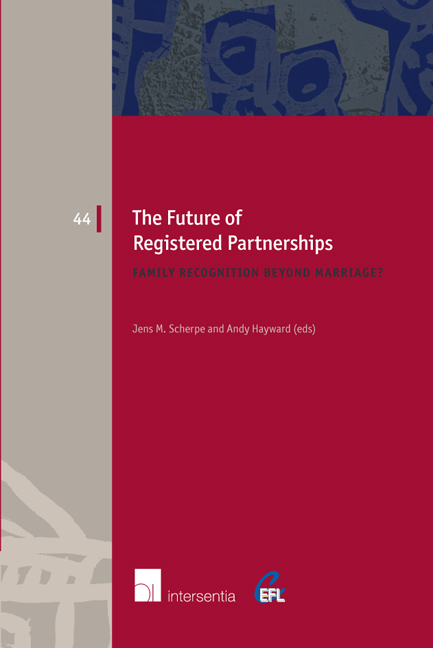Book contents
- Frontmatter
- Foreword
- Preface
- Contents
- List of Contributors
- The Future of Registered Partnerships: An Introduction
- Questionnaire
- Part I Registered Partnerships as a Functional Equivalent to Marriage
- Part II Registered Partnerships as an Alternative to Marriage
- Part III Registered Partnerships in a Time of Transition
- Part IV Alternative Models for Registered Partnerships: Beyond Conjugality, Beyond Formality
- Part V Registered Partnerships, Discrimination and Human Rights
- An ECHR Right to Access a Registered Partnership?
- Registered Partnerships in European Union Law
- Part VI Comparative Perspective and Conclusions
- Index
- European Family Law Series
Registered Partnerships in European Union Law
from Part V - Registered Partnerships, Discrimination and Human Rights
Published online by Cambridge University Press: 22 September 2018
- Frontmatter
- Foreword
- Preface
- Contents
- List of Contributors
- The Future of Registered Partnerships: An Introduction
- Questionnaire
- Part I Registered Partnerships as a Functional Equivalent to Marriage
- Part II Registered Partnerships as an Alternative to Marriage
- Part III Registered Partnerships in a Time of Transition
- Part IV Alternative Models for Registered Partnerships: Beyond Conjugality, Beyond Formality
- Part V Registered Partnerships, Discrimination and Human Rights
- An ECHR Right to Access a Registered Partnership?
- Registered Partnerships in European Union Law
- Part VI Comparative Perspective and Conclusions
- Index
- European Family Law Series
Summary
The role of the European Union (EU) in regulating family life has developed steadily since the Treaty of Rome in 1957. The EU's concern with family life originated in the provisions for the free movement of workers between the Member States, by which family members also had the right to migrate and accompany the worker. This has expanded to include private international family law rules, and the protection of family rights by the Charter of Fundamental Rights of the European Union. Under Article 7, the EU is obliged to respect private and family life, and Article 9 protects the right to marry and found a family in accordance with national laws.
Since 1957, there have also been significant social and legal changes in the acceptance and recognition of different types of familial relationships, particularly same-sex relationships. As explored by the contributions in this book, the legal changes in the recognition of same-sex registered partnerships and same-sex marriage have not been uniform and there remains significant variation in the law across the Member States of the EU. Whilst the EU's regulation of family life has expanded, it still has no competence to regulate the content and forms of family relationships. It must therefore respond, recognise and adapt to legal relationships as defined across the Member States. This is important in a space where families are multi-jurisdictional and social and moral norms surrounding the family and sexuality are not uniform, and exposes the differences in national culture and regulation of same-sex relationships in Europe.
The EU 's response to the concept of same-sex registered partnerships, and the lack of a coherent legal approach to this concept, has not been fully identified or explored across the spheres of EU activity. 3 In three contexts – the free movement of persons, non-discrimination in employment, and in cases brought against the EU by its own staff – the EU legislature and the Court of Justice of the European Union (CJEU) have addressed and recognised the effects of registered partnerships created by national law in European law. This process is continuing as more Member States make provision for same-sex marriage.
- Type
- Chapter
- Information
- The Future of Registered PartnershipsFamily Recognition Beyond Marriage?, pp. 497 - 524Publisher: IntersentiaPrint publication year: 2017

